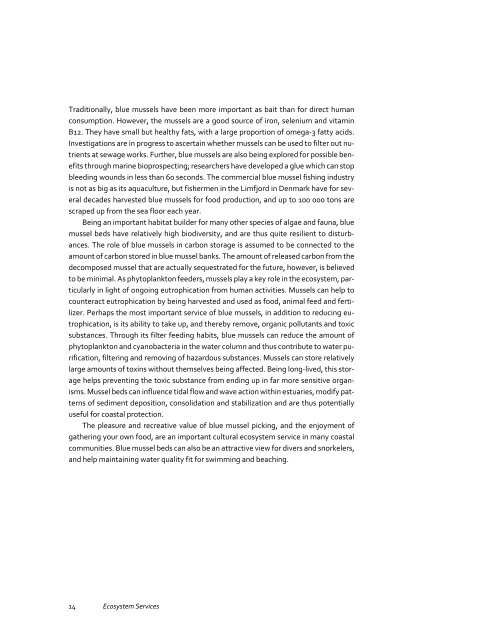Ecosystem Services
FULLTEXT01
FULLTEXT01
Create successful ePaper yourself
Turn your PDF publications into a flip-book with our unique Google optimized e-Paper software.
Traditionally, blue mussels have been more important as bait than for direct human<br />
consumption. However, the mussels are a good source of iron, selenium and vitamin<br />
B12. They have small but healthy fats, with a large proportion of omega-3 fatty acids.<br />
Investigations are in progress to ascertain whether mussels can be used to filter out nutrients<br />
at sewage works. Further, blue mussels are also being explored for possible benefits<br />
through marine bioprospecting; researchers have developed a glue which can stop<br />
bleeding wounds in less than 60 seconds. The commercial blue mussel fishing industry<br />
is not as big as its aquaculture, but fishermen in the Limfjord in Denmark have for several<br />
decades harvested blue mussels for food production, and up to 100 000 tons are<br />
scraped up from the sea floor each year.<br />
Being an important habitat builder for many other species of algae and fauna, blue<br />
mussel beds have relatively high biodiversity, and are thus quite resilient to disturbances.<br />
The role of blue mussels in carbon storage is assumed to be connected to the<br />
amount of carbon stored in blue mussel banks. The amount of released carbon from the<br />
decomposed mussel that are actually sequestrated for the future, however, is believed<br />
to be minimal. As phytoplankton feeders, mussels play a key role in the ecosystem, particularly<br />
in light of ongoing eutrophication from human activities. Mussels can help to<br />
counteract eutrophication by being harvested and used as food, animal feed and fertilizer.<br />
Perhaps the most important service of blue mussels, in addition to reducing eutrophication,<br />
is its ability to take up, and thereby remove, organic pollutants and toxic<br />
substances. Through its filter feeding habits, blue mussels can reduce the amount of<br />
phytoplankton and cyanobacteria in the water column and thus contribute to water purification,<br />
filtering and removing of hazardous substances. Mussels can store relatively<br />
large amounts of toxins without themselves being affected. Being long-lived, this storage<br />
helps preventing the toxic substance from ending up in far more sensitive organisms.<br />
Mussel beds can influence tidal flow and wave action within estuaries, modify patterns<br />
of sediment deposition, consolidation and stabilization and are thus potentially<br />
useful for coastal protection.<br />
The pleasure and recreative value of blue mussel picking, and the enjoyment of<br />
gathering your own food, are an important cultural ecosystem service in many coastal<br />
communities. Blue mussel beds can also be an attractive view for divers and snorkelers,<br />
and help maintaining water quality fit for swimming and beaching.<br />
14 <strong>Ecosystem</strong> <strong>Services</strong>


